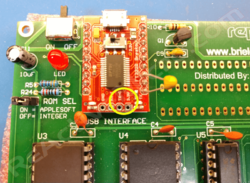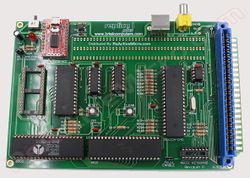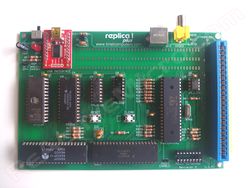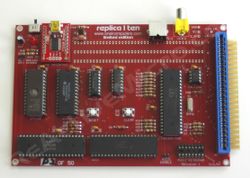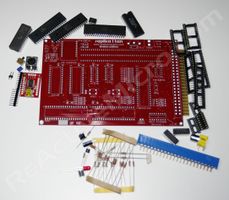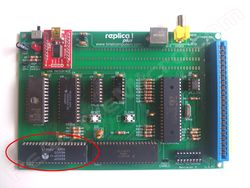Replica 1: Difference between revisions
Khaibitgfx (talk | contribs) No edit summary |
Khaibitgfx (talk | contribs) |
||
| Line 23: | Line 23: | ||
<div class="new_window"> | <div class="new_window"> | ||
<gallery class="center" widths=150px heights=80> | <gallery class="center" widths=150px heights=80> | ||
File: | File:Adobe Acrobat Logo 80x80.png|The Replica 1 Manual And Assembly Guide|link=https://wiki.reactivemicro.com/images/7/73/Replica_One_Plus_Manual_-_June_2014.pdf | ||
</gallery> | </gallery> | ||
</div> | </div> | ||
==Programming And Source Code== | ==Programming And Source Code== | ||
Revision as of 17:44, 4 November 2019

Current version from ReActiveMicro
The Replica 1 was created by Vince Briel of BrielComputers.com in 2003. The Replica 1 Plus was created in mid 2014.
Briel Computers specialized in retro hobby computer kits. They started in 2003 with a replica of the first Apple computer, the Apple 1. They focused on developing computer kits and boards like those you could purchase in the 1970′s and early 80′s.
In 2015 Briel Computers closed its doors and stopped accepting orders as Vince had a career change.
In September 2017, Henry from ReActiveMicro contacted Vince about reproducing his kits and projects for sale to help supply the current Community demand.
Project Status: Completed. In production. Actively sold by ReActiveMicro.
Support: Post on the Discussion page (link above) or email ReActiveMicro Support. The Briel Computers forums also hold a wealth of information.
Sales: Visit the ReActiveMicro Store.
Kit Assembly
The parts included with your Replica 1 kit and the PCB have basic labels. Those with intermediate knowledge should have little trouble assembling the kit from just these labels. The image of the Replica 1 can also be used for reference or to help determine orientation.
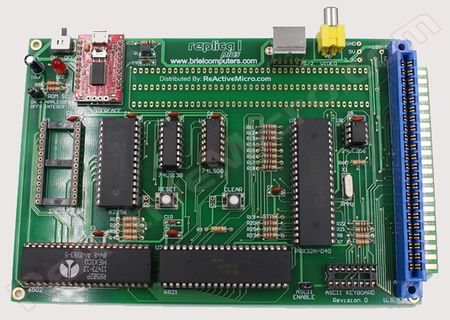
The manual also has the full assembly instructions. See chapter 4, page 12.
Programming And Source Code
The most current source code for the Replica 1 is here. You can find older versions on Briel Computers's Downloads page. Users are encouraged to edit and tinker with the project, and experiment with coding and how the Replica 1 systems work. ReActiveMicro will also help implement any hardware changes needed in new board and circuit revisions. As new software becomes available we will host it here or add links to user's pages and repositories.
Powering the Replica l and programming the Propeller microcontroller requires a standard USB-A to Micro-USB cable. A serial console connection to FT232R board can also be established via the same cable.
All Replica 1 assembled or kit units from ReActiveMicro will come fully programmed and tested. No further programming will be needed unless you request a "blank" unit. The steps to programming the Replica 1 are as follows:
- If you have a blank 27128 ROM start by first programming it. All boards from ReActiveMicro come with programmed ROMs.
- Install P8X32A Propeller Tools. Run the program.
- Make sure the FT232R's (small USB board) micro-switch is set to 5V (left side).
- To test that the Propeller Tool sees the Replica 1:
- Connect Replica 1 to PC with USB cable. (If Windows: Driver will install).
- Turn on Replica 1.
- In Propeller Tool click "Run" menu, then "Identify Hardware...".
- It should report "Propeller chip version 1 found on COMx".
- To load firmware:
- Click on File menu, then "Open".
- Open the Replica 1's firmware folder and select the file "110REV03.spin".
- Click on the "Run" menu, then "Compile Current", then "Load EEPROM".
- If you DID NOT get an error message the firmware is programmed. Done!
Screen Noise Issue
A few users have reported every few seconds a "/" appears on their screen followed by a linefeed. This renders any data entry impossible. The issue isn't present when connected to a PC.
There are two options to resolve this issue: Reprogram the Replica 1 with the most current firmware, or add a 100k resistor to the USB module.
It's best to reprogram the Replica 1, however we found that installing a 100k resistor on the Tx data line to the Propeller as a hardware fix as opposed to a software fix resolved the issue. As little as 10k can be used for +3.3v pullup, but anything smaller risks damage to the FTDI module. 100k is much safer in all regards. This helps hold the data line high. It seems the RX line is held high by default. And both lines are held high when connected to a USB data port, which is why the noise issue is not seen when connected to a PC.
You can connect the resistor most simply to the USB module. Or to the rear of the PCB to pin 39 (Tx) and pin 12 or 32 (+3.3v) of the Propeller.
-
Screen Noise Fix Solder Location
History
Vince Briel started Briel Computers in 2003 as a result of high demand for replica 1 computers. It started out as a hobby to build a replica of a computer he could never own. Soon, Leander Kahney learned of his project and wrote an article for Wired Magazine.
At the time, the replica 1 was not finished and no response came from Apple about use of Woz's code. Then Woz was kind enough to allow use of the code, thus creating another article in Wired.
In 2015 Briel Computers closed its doors and stopped accepting orders as Vince had a career change and had little time left for the hobby business.
In September 2017, Henry from ReActiveMicro contacted Vince about reproducing his kits and projects for sale to help supply the current Community demand. Vince was more than happy to see his project live on and supplied ReActiveMicro with all the files needed to start production.
Versions
ReActiveMicro started producing Replica 1 Plus v1.0 in November of 2017. This version can be easily identified by the "Distributed By: ReactiveMicro.com" marking under the "replica 1" name in the middle top of the board. This version is a direct reproduction with no other edit or changes made.
-
Replica 1 Plus v1.0 from ReActiveMicro
Here are some past versions of the Replica 1 board by Briel Computers.
-
Replica 1 Plus, Revision 0.
-
Replica 1 Ten, Limited Edition.
-
Replica 1 Ten kit, Limited Edition.
CPU
The Replica 1 normally comes with a 6502 CPU. The newer 65C02 can be used, however there is no benefit and the newer OpCodes will not be used unless the user calls them directly. This however is not "standard" and other 02 compatible software would not use the C02.
There were some bug fixes in the C02 CPU. Software could be written that exploited these bugs in the old CPU, however none are known. All of the known Apple 1 software should work fine on the C02 CPU.
To identify which CPU you have installed on your Replica 1 look at U1 located on the lower left of the PCB. If the letter "C" is in the middle of the part number then it's a 65C02 CPU and not a 6502 CPU.
-
Replica 1 CPU Location
Krusader Assembler
KRUSADER is a program written to allow assembly language development on the Replica 1. It is included with the current distribution from ReActiveMicro within the Integer ROM selection. Be sure the "ROM SEL" jumper is OFF to select Integer. Then type "F000R" at the prompt and press Enter to start Krusader.
To Do
Upload disk images to the RM FTP site in correct folder.

